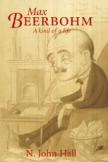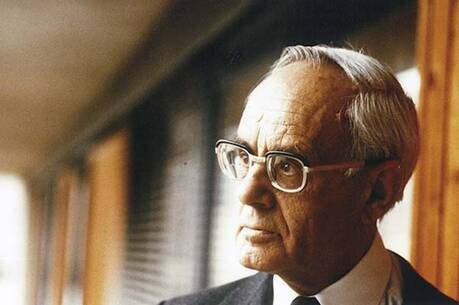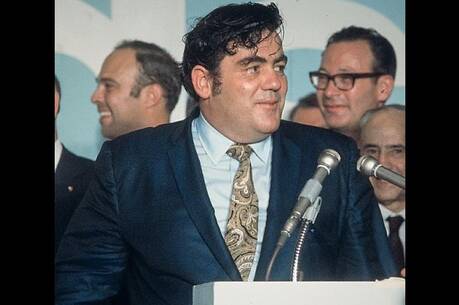The Coolest Edwardian
Well, he was also a late Victorian (born in 1872). He did his most celebrated writing and drawing in the reign of George V, and he survived George VI (dying in 1956). But as Hall convincingly claims, For Max, the past remained present. From the day he left the London scene in 1910 he was for nearly half a century the most eloquent embodiment and expression of the bygone Edwardian years. A tongue-in-cheek, conservative decadent, a not-too-foppish Wildean-Whistlerian dandy, the most unobtrusive of social butterflies, the most beguiling and self-deflating of littérateurs, an effortlessly entertaining wit (despite the smidgeon of truth in Lytton Strachey’s dictum that, [Max] has the most remarkable and seductive geniusand I should say about the smallest in the world), Beerbohm was in many (however minor) ways more or less perfectwhich would seem to make him a rather unpromising subject for a new biography.
To begin with, his life was practically devoid of tragedy, conflict or deep passion of any kind. I adored my father and mother, he wrote, and I adored my brothers and sisters. What kind of complex would they find me victim of? ...They were a tense and peculiar family, the Oedipuses, weren’t they? Though to all appearances a genteelly repressed homosexual, he made two tender if sexless love matches, first with Florence Kahn, then with Elisabeth Jungmanwho fervently returned his platonic affection. He had a placid, incurably cheerful disposition. Despite his mordant caricatures, satires and parodies (his Christmas Garland [1912], with its dead-on spoofs of Henry James, Thomas Hardy, Joseph Conrad et al. remains unsurpassed), he had next to no real enemies. He spent serene productive decades at his sunny Villino Chiaro in Rapallo. His long life was untouched by scandal, stunning revelations, angst or heartache. Apart from some inept medical attention he got during his last weeks, he led a life without pain. Finally, Beerbohm has already been well served by two reliable biographers, one more academic, David Cecil (1964), the other more anecdotal, N. S. Behrman (1960). So what was left for Hall to do?
Celebrate, simply celebrate. Distinguished Professor of English at Bronx Community College and CUNY Graduate School, Hall has already published a conventional life of Anthony Trollope, as well as Max Beerbohm’s Caricatures. He knows all the minutiae of Max’s career, but he has an unaffectedly casual, impromptu-sounding style that fits his subject beautifully. His book is full of random authorial asides: Shaw. I am saving Max on Shaw. I am nervous about what comes next: Florence KahnMax’s courting of, marriage to, and life withis the strangest part of his story. At this point I’d like to make some suggestions for those who want to immerse themselves in Max’s oeuvre or even just discreetly dip into it. (And he provides generous samplings throughout the book.)
Best of all, perhaps, having admitted that a long series of tributes from honorary doctorates to knighthood, eventually turned Max into a sort of sacred cow, Hall dedicates an entire chapter to The Case Against, a light-hearted indictment listing every complaint anyone ever made against Max: that he hated democracy, that he was a pessimist, that he didn’t believe in progress, that he didn’t think art had a purpose, that he never grew up, that all his tastes permanently froze when he moved to Italy at the age of 37, etc. Hall frankly admits that some of these charges are true or partially true, while others are quite false (he never denied his Jewish roots, because he had none). But in the final analysis, the warts are few and far between. A Dorian Gray picture of Max Beerbohm does not exist.
He was, in every sense of the word, a characterand he knew it. What have my pleasures been? he reminisced shortly after his Oxford years, To dress carefully, to lie in a canoe in the summer and read minor verse by the fire in winter, to talk of Oscar, to sit down to dinner looking forward to rising from it drunk, to draw more or less amusing caricaturesa few friends, a few theaters and music halls and cigarettes a dayand there you have my life. Max detested sports and avoided exercise. In his artfully careless way, he left Oxford without a degree, never had a real job except (against his will) as a reviewer of plays. He married but neglected to have children, he emigrated to Italy but never learned Italian. He had no discernible politics and didn’t vote. (He said he cared more about a misplaced comma than the loss of the British Empire.) Max, Hall summarizes, refused to enter the so-called modern era. He did not grow with the times. He never liked the twentieth century. Was this a failing?
So was he a mere trifler, narrow and superficial? In some ways, yes. He couldn’t see much farther back than Thackeray or, at most, Johnson; and he couldn’t see forward at all. He had no use whatsoever for the modernists. He ignored his great continental contemporaries and the major issues of his day. The very notion of his having an inner life sounds preposterous or pretentious or both. And yet, apart from sensible volumes of criticism, he wrote the quasi-immortal Zuleika Dobson, Savonarola Brown, and Enoch Soames. He brilliantly caricatured Tennyson, Browning, Arnold, Swinburne, Edward VII and countless other public figures (some 2,000 drawings in all).
Perhaps, then, he was just a character, an amusing mask that he never took off his blank, if agreeable, face? Hall is not quite certain about this and ends up suggesting that Max saw what he wanted to be and went after it, only to find that he had been that person all the time.
That personsuave, amiable, unruffledmay now seem as remote as some minor figure in a Gilbert and Sullivan operettanot silly enough for Patience, not vehement enough for The Mikado. His worldthe exquisite, cranky hermit crab’s shell he built and inhabitedmost certainly is long gone. But that only proves, among other things, how wretched our own frightfully real and serious world has become.
This article also appeared in print, under the headline “The Coolest Edwardian,” in the October 14, 2002, issue.








